
While various critical needs such as sanitisation, health and water have been the focus during the Covid-19 pandemic in the country, challenges relating to access to education need to be revisited and addressed as a matter of urgency as they, too, have an equally detrimental impact on society. Interruptions to education that have emanated may not necessarily be new, but the pandemic has certainly brought them to light for all to see. Students who were already marginalised and vulnerable are further alienated by the demands of access to education in the new normal.
Even though Unisa is an open, distance and eLearning (ODeL) institution, the overnight shift caused by Covid-19 and the subsequent national lockdown have derailed students in various ways. Some Unisa students share with us their challenges and experience so far.
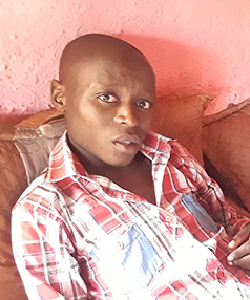
Phiwe Dekisile
The first critical area in which the Covid-19 pandemic has had an impact on students is the growing inequality margin. While Unisa is an ODeL institution, there are thousands of students who make use of the university’s onsite resources such as access to electricity, reliable Wi-Fi and a conducive studying environment. During the lockdown and by virtue of protocols to be adhered to such as social distancing during the pandemic, students who primarily relied on these resources are now left in the dark. This proves that success in higher education is not evenly distributed; students who come from privileged backgrounds have a higher chance of success.
Says Phiwe Dekisile, a first-year Diploma in Law student: "I have been struggling with everything, mostly because in my home I don't have electricity. Added to this is a poor network connection. Consequently I wrote one of my examinations at a mountain which is 3 km away from my home. I am frustrated as I am unable to afford to rent a place in town where I can get access to electricity and a good network connection. Recently, I had to write my examination late as the network connection was slow."
The pandemic has revealed and exacerbated the higher education opportunity divide. Dekisile’s experience along with that of many others like him shows how important access to fundamental services and support structures are to the well-being and success of students. This pandemic is proving that access to resources accrues advantages in learning. A student with a private place to study, reliable network connection, access to electricity and a less economically stressed home environment enjoys tangible benefits in comparison to a student like Dekisile.
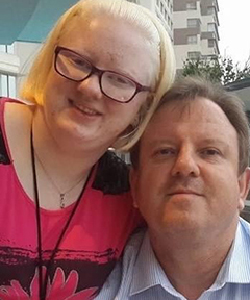
Thea Harman and her late dad
Covid-19 and the subsequent lockdown around the globe have arguably caused the biggest psychological turmoil in living memory. Losing a loved one, even in normal circumstances, is difficult to bear. One can imagine that in the midst of the pandemic, feelings of loss and grief are amplified. For Bachelor of Laws (LLB) student, Thea Katelynn Harman, the pandemic brought about a roller-coaster of emotions. Sharing her story, Harman says: "My father and I decided, together, to study for the LLB at Unisa in 2017. We had completed two-and-a-half years out of the five-year period of study. This semester everything changed. My dad got Covid-19 even though we were so careful and followed every precaution. My father was admitted in hospital early in April. Shortly after his admission he was placed on a ventilator – a breathing machine – where he remained for 29 days. During his stay at the hospital, a retest was done and the results were negative but the damage caused by the virus was so severe that he passed away."
Harman says that the Covid-19 pandemic is a rollercoaster of emotions on its own, but losing a loved one specifically to the virus can potentially break you. While Harman is mourning the loss of her beloved father she has great words of encouragement. "I believe that the key to surviving this difficult time is the ability to adapt to change," she says.
"My whole world has been turned upside down because of this virus. From studying as a duo I am now flying solo. Even though I have endured trauma in the past two months, I am still putting my best foot forward," she adds. Regardless of her loss, Harman has continued to work extremely hard towards her studies this semester and has passed her assignments with flying colours.
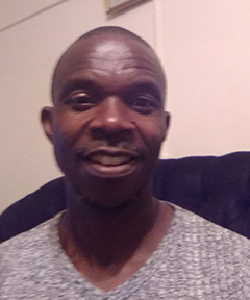
Stanley Ndlovu
Stanley Ndlovu, a BA International Relations student, shares a similar experience. Ndlovu lost his young brother and aunt during the lockdown and sadly had to miss their memorial services as he was doing preparations for his examinations. This consequently had a major emotional impact on him that he wrote and sent a wrong assignment. Being a determined person, however, Ndlovu quickly realigned his emotions and resolve. "I will never let the impact of Covid-19 derail my dream to graduate at Unisa," he says. "My younger brother would love to see me in a graduation gown to make up for not being able to be at his funeral."
"I draw strength from the fact that l am able to write my examination in the middle of what took my beloved brother and aunt's lives," he adds. While the Covid-19 pandemic continues to threaten normalcy everywhere, Ndlovu thanks Unisa staff for salvaging the almost disrupted academic year.
While Harman and Ndlovu have experienced loss and grief, they have chosen to heal and are investing their energy in their studies. It is amazing how the human spirit is able to rise in the midst of calamity.
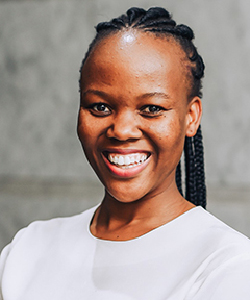
Nkamogeleng Matloga
Not all is doom and gloom, though. For some, the lockdown brought about an opportunity to reconnect with themselves. Nkamogeleng Matloga, a BSc Life Sciences student, says that she has learnt to be aware of her blessings in life.
"For example, I do not miss the traffic. I pray every morning – it helps to find something to be grateful for," she says. "I have also used my time to take regular walks and do a few home exercises. I now also have time to dedicate seven hours to working productively. Dinner time is family time. I must say with everyone being in the house, it’s a great bonding time."
Matloga adds that family time is often followed by school work or other activities related to self-advancement. She says, however, that some days are different as things don’t always go according to plan. "I generally feel healthy and mentally well compared to the start of lockdown. I have also learnt time management and self-love through this pandemic," she explains.
In the midst of the catastrophe, the lockdown has indeed given us time to slow down, breathe and take life in. This for many has been a time to take stock and introspect. This is an opportunity for self-awareness as we look inward to gain new perspective.
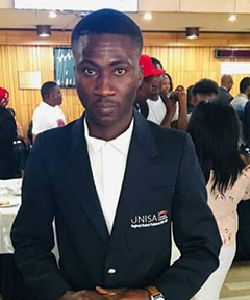
Excellent Baloyi
Excellent Baloyi, Speaker of the Tshwane Regional Student Parliament, says that institutions of higher learning have been faced with a number of obstacles which emanated from the pandemic.
"Among these," he says, "was the call for saving the 2020 academic calendar. Unisa, as an ODeL institution, became a champion of online learning in the country. While it has not been an easy road, Unisa has proven to be a leading university through open access and availability during this difficult time. In light of this we, the Tshwane Regional Student Parliament office bearers, salute the management and staff of the university."
Baloyi encourages Unisa students to remain strong. "Continue showing humanity to your peers and, most importantly, subscribing to the ubuntu principles that guide the Unisa community," he concludes.
* By Tshimangadzo Mphaphuli, Senior Journalist, Department of Institutional Advancement
Publish date: 2020-06-20 00:00:00.0